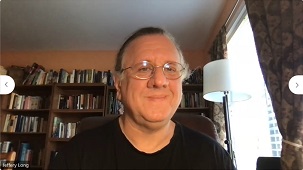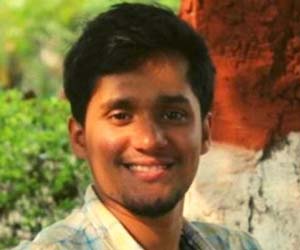On 9th May, 2022, Vivekananda International Foundation (VIF) organised a book discussion on "Hinduism in America: A Convergence of Worlds, authored by Prof. Jeffery D. Long, Professor of Religion and Asian Studies at Elizabethtown College, U.S.A. His major specialisations are in the field of Indian philosophy and traditions. He has authored many books and articles on Dharmic traditions, and is also a recipient of the Hindu American Foundation’s Dharma Seva Award for his academic and non-academic contributions. He has previously spoken at many universities like Princeton, Yale, Chicago, JNU and has given talks at the United Nations, thrice.
Dr. Arvind Gupta, Director of VIF, who chaired the event, in his introductory remarks observed that the topics covered in this book are relevant for various reasons. It is mainly because there is a 4th generation of Indian origin population in the United States, who play an important role in America’s nation building, economic development and also in structuring international relationships with India. There is also a growing interest in Hinduism and India even amongst Americans, who do not have an Indian origin but are influenced by the universal message and practices of Hinduism, and by figures like Swāmī Vivekānanda and other contemporary Gurus. But beyond these positive stories, the Director also highlighted the stories of concern like that of the recent academic conference called ‘Dismantling Global Hindutva’, and how in general the academic study of Hinduism in universities often create wrong perceptions about Hinduism among Americans and the World in general.
Prof. Long began the discussion saying that one of his motivations to write this book, which largely covers the positive story of Hinduism in America, was also because of the aspects mentioned by the Director in the introduction. He said that such controversies were largely responsible for creating effective misinformation about Hinduism among the American population who hardly knows anything about Hinduism or India. Prof. Long said that his book covers the story of how the ‘two worlds’ are converging. The one world being the Indian population, who have come and settled in America and succeeded in creating an Hindu atmosphere, and establishing their tradition in a foreign land. While the other is a world of people, who are not Indians but in their journey of life, gradually get attracted to Hinduism and its practices, which they adopt in their life in various ways. Prof. Long argues that these two worlds are increasingly coming together, which is why the subtitle of his book is given as ‘Convergence of two worlds’. He highlights that there have been works that study about these groups separately but he urges the contemporary need for studying them in tandem. He said he is also aware of the issues associated with this, one such is about the possible ‘cultural appropriation’ when the two worlds merge. Prof. Long mentioned the example from the Yoga community, while there are many populations who are interested in Yoga, they might tend to distinguish it from the larger association and concepts of Hinduism. This way many of them manage to keep a negative attitude towards Hinduism and yet practice some of the aspects of it.
Prof. Long’s presentation slides were filled with a lot of pictures to generate interest and curiosity among the audience, and to go deep into the book. In the presentation, he showed how despite the image of America being a country with a Christian population, a good amount of them think similar to the Hindu concepts of reincarnation, religious pluralism, etc. Many of them may not associate themselves as a ‘Hindu’ in records but in ways of thinking they are more in line with Hinduism. This is largely because of the concepts of Hinduism that are universal and eternal, and could be followed and practiced from anywhere and against any life situations. He also showed the list of key figures which he thinks to be important in the thriving of Hinduism and its concepts in America. According to Prof. Long, after Svāmī Vivekānanda and Mahātma Gandhi, it is The Beatles’s George Harrison, who is of a non-Indian origin responsible for introducing Hinduism to the American population. He also highlighted the role of contemporary figures in politics like Tulsi Gabbard, Ro Khanna, Raja Krishnamurthi and Pramila Jayapal, who remain as Hindus and yet participate in mainstream American politics.
The speaker also highlighted that a new generation of the Hindu Americans have also started to speak for their rights and rights of others, and also to correct misconceptions about Hinduism and India. Prof. Long mentioned the example of Hindu American Foundation (HAF) to highlight this aspect. Such establishments were largely missing in the earlier generations, who just wanted to live, let live and adapt, assimilate but the younger generation have begun to voice against the stereotyping and correct the misconceptions in a peaceful manner.
Despite the controversial aspect of an ongoing misrepresentation of Hinduism in America, Prof. Long says he is hopeful that to prevent such things from happening we can develop quality scholarship about Hinduism and India. Because there are a good number of people in America who are open to it and could be persuaded to study Hinduism in its actual sense. The misconceptions are perpetuated in a vacuum among the population that has absolutely no knowledge of these traditions.
Dr. Arvind Gupta concluded the session by saying that Hinduism in America is a very compelling story to tell, to talk about the universal nature of Hinduism. Because the success story of Hinduism and its concepts in America didn’t arise out of any missionaries or Gurus, who went to America with a motive to ‘convert’ the population. But it is becoming increasingly successful because of a vacuum or a demand arising out of a good number of the population in America. He also hinted that the negative stories of rising polemics against Hinduism in academic conferences and works could be to resist the increasing popularity in America towards Hinduism and its universal concepts.











Post new comment